Figure 3.33 shows a potentiometer with a cell of 2.0 V and internal resistance 0.40Ω maintaining a potential drop across the resistor wire AB. A standard cell which maintains a constant emf of 1.02 V (for very moderate currents upto a few mA) gives a balance point at 67.3 cm length of the wire. To ensure very low currents drawn from the standard cell, a very high resistance of 600kΩ is put in series with it, which is shorted close to the balance point. The standard cell is then replaced by a cell of unknown emfε and the balance point found similarly, turns out to be at 82.3 cm length of the wire. Would the method work in the above situation if the driver cell of the potentiometer had an emf of 1.0V instead of 2.0V? :
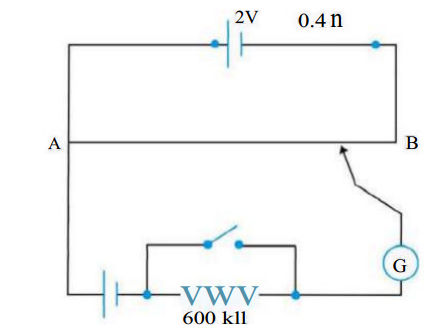 Solution in Punjabi
Solution in Punjabi
Step by step video solution for Figure 3.33 shows a potentiometer with a cell of 2.0 V and internal resistance 0.40 Omega maintaining a potential drop across the resistor wire AB. A standard cell which maintains a constant emf of 1.02 V (for very moderate currents upto a few mA) gives a balance point at 67.3 cm length of the wire. To ensure very low currents drawn from the standard cell, a very high resistance of 600 k Omega is put in series with it, which is shorted close to the balance point. The standard cell is then replaced by a cell of unknown emf epsilon and the balance point found similarly, turns out to be at 82.3 cm length of the wire. Would the method work in the above situation if the driver cell of the potentiometer had an emf of 1.0V instead of 2.0V? : by Physics experts to help you in doubts & scoring excellent marks in Class 12 exams.
Similar Questions
Figure shows a potentiometer with a cell of 2.0 V and internal resistance 0.40 Omega maintaining a potential drop across the resistor wire AB. A standard cell which maintains a constant emf of 1.02 V (for every moderate currents upto a few mA) gives a balance point at 67.3 cm length of the wire. To ensure very low currents drawn from the standard cell, a very high resistance of 600 Omega is put in series with it, which is shorted close to the balance point. The standard cell is then replaced by a cell of unknown emf epsi and the balance point found similarly, turns out to be at 82.3 cm length of the wire. What is the value epsi ?
View SolutionFigure shows a potentiometer with a cell of 2.0 V and internal resistance 0.40 Ω maintaining a potential drop across the resistor wire AB. A standard cell which maintains a constant emf of 1.02 V (for every moderate currents upto a few mA) gives a balance point at 67.3 cm length of the wire. To ensure very low currents drawn from the standard cell, a very high resistance of 600 Ω is put in series with it, which is shorted close to the balance point. The standard cell is then replaced by a cell of unknown emf ε and the balance point found similarly, turns out to be at 82.3 cm length of the wire.
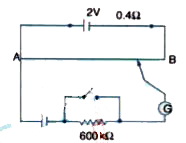
What purpose does the high resistance of 600 K Ω have ?View SolutionFigure shows a potentiometer with a cell of 2.0 V and internal resistance 0.40 Omega maintaining a potential drop across the resistor wire AB. A standard cell which maintains a constant emf of 1.02 V (for every moderate currents upto a few mA) gives a balance point at 67.3 cm length of the wire. To ensure very low currents drawn from the standard cell, a very high resistance of 600 Omega is put in series with it, which is shorted close to the balance point. The standard cell is then replaced by a cell of unknown emf epsi and the balance point found similarly, turns out to be at 82.3 cm length of the wire. Would the method work in the above situation if the driver cell of the potentiometer had an emf of 1.0 V instead of 2.0 V?
View SolutionFig. shows a potentiometer with a cell of 2.0V and internal resistance 0.40Omega maintaining a potential drop across the resistor wire AB. A standard cell which maintains a constant emf of 1.02V (for very moderate currents upto a few pA) gives a balance point at 67.3 cm length of the wire. Io ensure very low currents drawn from the standard cell, a very high resistance of 600kOmega is put in series with it which is shorted close to the balance point. The standard cell is then, replaced by a cell of unknown emf e and the balance point found similarly turns out to be at 82.3 cm length of the wire, What purpose does the high resistance of 600kOmega have?
04:17View SolutionFig. shows a potentiometer with a cell of 2.0V and internal resistance 0.40Ω maintaining a potential drop across the resistor wire AB. A standard cell which maintains a constant emf of 1.02V (for very moderate currents upto a few pA) gives a balance point at 67.3 cm length of the wire. to ensure very low currents drawn from the standard cell, a very high resistance of 600kΩ is put in series with it which is shorted close to the balance point. The standard cell is then, replaced by a cell of unknown emf e and the balance point found similarly turns out to be at 82.3 cm length of the wire,
Is the balance point affected by this high resistance?
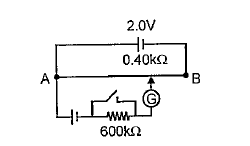 03:42View Solution
03:42View SolutionFigure shows a potentiometer with a cell of 2.0 V and internal resistance 0.40Ωmaintaining a potential drop across the resistor wire AB. A standard cell which maintains a constant emf of 1.02 V (for very moderate currents upto a few mA) gives a balance point at 67.3 cm length of the wire. To ensure very low currents drawn from the standard cell, a very high resistance of 600kΩ is put in series with it, which is shorted close to the balance point. The standard cell is then replaced by a cell of unknown emfε and the balance point found similarly, turns out to be at 82.3 cm length of the wire. What is the value ε ? :
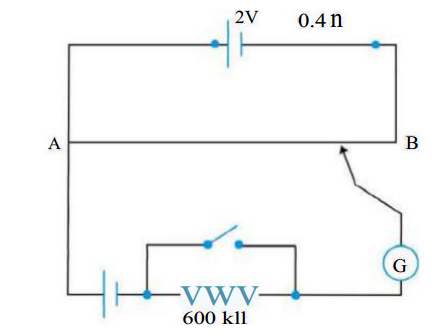 03:07View Solution
03:07View SolutionFigure shows a potentiometer with a cell of 2.0 V and internal resistance 0.40Ω maintaining a potential drop across the resistor wire AB. A standard cell which maintains a constant emf of 1.02 V (for very moderate currents upto a few mA) gives a balance point at 67.3 cm length of the wire. To ensure very low currents drawn from the standard cell, a very high resistance of 600kΩ is put in series with it, which is shorted close to the balance point. The standard cell is then replaced by a cell of unknown emfε and the balance point found similarly, turns out to be at 82.3 cm length of the wire. What purpose does the high resistance of 600kΩ have? :
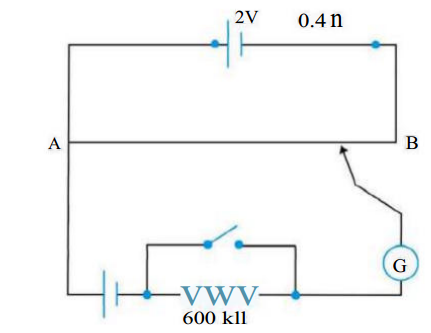 03:51View Solution
03:51View SolutionFigure 3.33 shows a potentiometer with a cell of 2.0 V and internal resistance 0.40 Omega maintaining a potential drop across the resistor wire AB. A standard cell which maintains a constant emf of 1.02 V (for very moderate currents upto a few mA) gives a balance point at 67.3 cm length of the wire. To ensure very low currents drawn from the standard cell, a very high resistance of 600 k Omega is put in series with it, which is shorted close to the balance point. The standard cell is then replaced by a cell of unknown emf epsilon and the balance point found similarly, turns out to be at 82.3 cm length of the wire. Is the balance point affected by the internal resistance of the driver cell?:
03:07View Solution

